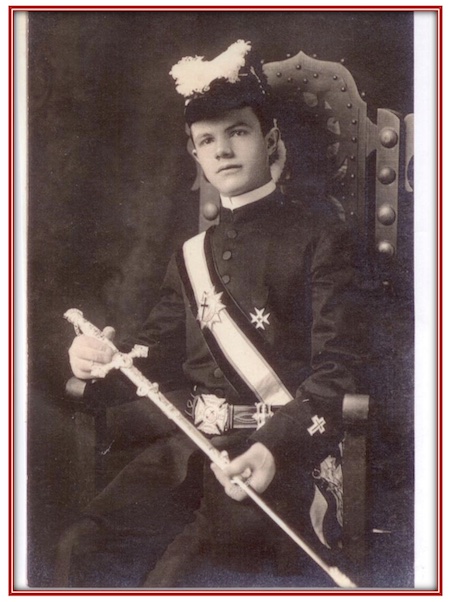Diary from 1907 details 19-year-old’s new life in Holley after moving from NYC
By Catherine Cooper, Orleans County Historian
“Illuminating Orleans” – Volume 4, No. 5

Elbert Johnston was initiated as an Entered Apprentice of Murray Lodge No. 380, Free and Accepted Masons on January 25, 1910, passed to the degree of Fellow Craft on February 8, 1910, and was raised to the sublime degree of Master Mason (Third Degree) on February 22, 1910.
HOLLEY – May 4, 1907: “Up early, left New York, 7:50 am train….. At Mauch Chunk (PA.), went into the dining car and had dinner, Vegetable soup, English mutton chops, potatoes with cream and ice-cream, cost $1.25 with a tip of 25c. The waiter gave me the menu as a souvenir…..Had to change trains at Rochester….Mailed card to Mother….Walked about a mile from the Lehigh Valley Station to the N.Y.C.& H.R. Railroad and waited for the 7:55 pm train. Reached Holley nearly 9 pm.”
Thus begins a charming journal, written by Elbert Johnston, then aged 19, as he started his journey to a new job and a new life in Holley, NY. The journal is short-lived, little more than a month long, but the entries are detailed and offer a unique view into daily life in a rural village at that time.
Elbert was born in New York in 1887. His mother died when he was young. His father remarried. Following his death, Elbert was raised by his stepmother, Emma Johnston. He worked at the U.H. Dudley Co. in the city.
In May of 1907, he moved to Holley to work as a bookkeeper at Hudson Canning, the family business. Elbert’s Aunt Alice was the wife of Joseph B. Hudson, originally from Mattituck, Long Island, who had built the Hudson Canning factory in Holley in 1901. (See Column V4, No.4)
When he arrived, Elbert noted that “The house is not quite finished inside, and things are all in any old place.” It seems that his aunt and uncle had just moved in. There are references throughout to workmen in the house, the new bathtub “Very good washing, only the sides are slippery,” carpet selection, planting a hedge, sowing grass seed and putting sheep-manure on it.
Having arrived on a Saturday, Elbert attended the Baptist Church next day:
“I was welcomed and stayed to communion and Sunday School. The new minister, Rev. Herrell had a cold and could not speak very well. There were 81 people present and about half of that number in church service.”
He “fell in” to work at Hudson Canning on Monday, May 6 and “began to charge from farmers seed receipts to farmers ledger. Wrote letter to Gt. A&P Tea Co….and later mailed them 200 Hudson gallon apple labels by express collect.”
He recorded details of what he worked on each day at the Canning factory office.
It seems that there was a backlog of accounting to be dealt with. Once that was in order, he spent a great deal of time cleaning the “capper,” the machine which was used to process the pea crop.
At the end of the first week, Elbert wrote:
“Well, here I have been for one entire week, and I hardly know anyone….Kind of lonely, evenings not like the city.”
The next morning, he still had a “blue streak on, but I guess I had better laugh.”
That was about to change. He became friendly with George Dibble, a young man of the same age, whose father was involved in the Orleans Canning Company. Pretty soon, the two young men were out each evening for drives, or walks around the village, or to the cemetery or The Glen, accompanied at different times by Claire, Kathryn, Cora, Sally and Jennie, Miss Copping or Isabella Newton.
For evening entertainment, they visited the young ladies’ homes to hear them play piano or gramophone records. At his aunt’s house, Elbert played Dominoes, Pit, or Flinch or sometimes read.
Elbert’s first outing with George is worth noting. George invited him to a Women’s Suffrage meeting at the Presbyterian Church. The speaker was Mrs. Shaw.
“Her talk was interesting to those who perhaps were in favor of woman suffrage, but after sitting from eight to ten on a hard straw cushion and then not having converted me, well she wasn’t very good.”
Elbert was an inveterate “numbers person.” It is entirely appropriate that he wrote this journal in a Cash Ledger as he noted all his expenses and spending.
He noted attendance at every church service he attended. He noted the number of people he passed in the town square. On the evening of May 16, having shaved and put on his high collars etc., he and his new friend, George, went for a short walk and passed twenty-five people “That is pretty good for a little place like Holley.”
Later, on May 17, he noted: “While out, not counting the Square, there were 214 people that we passed, or about one nineth of the population. At the Church, there were over a hundred people.”
He noted the time he went to bed and the time he got up each day – he retired 9 p.m. to 10 p.m., but as late as 11:15 p.m. once. He generally rose around 6 a.m., a little after 7 a.m. on Sundays. He noted the weather and temperature each day. It turned cold on the second week of May and snow fell on May 10.
He mentioned meals as “after breakfast” or “home to dinner,” but unfortunately, he did not specify what they ate. On two or three occasions, he refers to buying grapefruit when they were out, they were 5 cents each.
It is interesting to note how important mail was as a means of communication prior to phones. The Hudson household had a phone, but there are references to the expense. Letters required a 2-cent stamp, postcards a 1-cent stamp. Postcards cost 5 cents.
On the journey to Holley, Elbert mailed a card to his mother from Rochester. During the month, Elbert received 26 letters and 5 postcards. These were from his mother, his friends George and Brooks, a young lady named Ethel, and former work colleagues from the Dudley Co., including the office-boy, Eugene Davis, whose card “Hope you arrived safe,” mailed in NYC on May 6, arrived in Holley on May 7. Elbert saved this correspondence, replied to each piece and made notes of his correspondence.
Elbert mentioned at the end of one day’s entry that “Uncle (Joseph Hudson) wants meaning of Deut. 14-26-28”. A few days later, Elbert mentioned that he had written to Dr. R.S. MacArthur for a “church letter,” and for an explanation of Deut.14-26. Dr. MacArthur was pastor at the Calvary Baptist Church in New York. Elbert presumably needed the “church letter” to transfer membership to the Holley church.
Elbert must have felt sufficiently at ease in Holley after the first month that he did not have to chronicle his experiences, or perhaps his blossoming social life did not allow him sufficient time to write – his gain, our loss. This diary is one of the many unique items in the Orleans County Dept. of History collection.























































